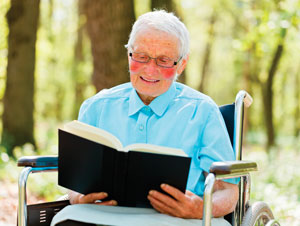 Asked to dance
Asked to dance
When people with disabilities were asked to help lead worship, the results were transformative.
By Sue Montgomery
As the team leader for the General Assembly Disability Consultants, I was asked to lead a workshop for people living with disabilities.
I was more than happy to help. Workshops like these are very much the work of Presbyterians for Disability Concerns, a network of the Presbyterian Health, Education, and Welfare Association that empowers the church to better affirm, support, and advocate for the gifts, rights, and responsibilities of persons with disabilities in the total life of the church.
Early in the planning, the committee gave me the history of the annual retreat and told me that a biblical focus was what the participants requested. “No problem!” I said. Many new Bible studies have been written and published by people who live with disabilities. This was going to be fun.
Then I was told that there would be a closing worship service on Saturday after lunch, and I was asked if I’d be willing to plan it. Traditionally the service included Communion. As a teaching elder, this too was no problem. “I’d be glad to do so,” I said.
Then I asked, “Would the participants in the workshop like to participate in the worship service as leaders—read the Scripture, share in the prayers, and if any were ruling elders, serve Communion?” The question was followed by dead silence, the kind of silence that implied that the other people on the conference call were shocked.
Sensing the tension, I asked again, “Would the workshop participants like to assist in leading the worship service?” This time the silence was filled with a strong and stern voice: “Absolutely not. You wouldn’t be able to understand their words. You wouldn’t be able to hear them speak. What if one of them dropped the bread or the Communion glasses?” The answer was clear, “No, no, and no. People with disabilities cannot lead worship. It must be done for them.”
On the first day of the retreat, supper was served, and the evening session opened. The Bible study was on the gifts of the people of God. We discussed the ancient traditions in Leviticus where people with disabilities were shunned from leadership roles. Due to the supposed impurity of the disability, anyone with a lame foot or impaired hand could not enter the holy places of the temple. No one with a disability could serve as a priest or in any leadership role.
The session discussed the many gifts, talents, insights, and wisdom people with disabilities have—gifts the church needs. We talked about persons who live with disabilities who are attending seminaries and serving as elders, teachers, counselors, and leaders in the church. At the conclusion of the session, I invited participants who would like to plan and lead Saturday’s worship service to meet with me after the closing prayer.
Nearly every participant stayed. There was excitement in the air. The joy of being asked and affirmed was palpable. For the rest of the retreat a young woman with developmental disabilities worked hard on reading the 23rd Psalm. Her caregiver, a volunteer, and I supported her as she diligently practiced the words and read them, at first with hesitation and then with full-blown confidence. A woman who was unable to read because of a traumatic brain injury asked her peers for their prayer concerns in advance. She memorized their concerns, and when new prayer concerns were raised during worship, she was able to incorporate them into the pastoral prayer. Her ability to memorize was phenomenal.
Two little people, filled with spirit and joy twice their size, were ruling elders in their home churches. One was a recovering cancer survivor. They offered to serve Communion. A young man living with cerebral palsy offered to read the New Testament passage. His voice was halting, yet steady and firm. Everyone who spoke that day was heard and understood. No one dropped the Communion elements (and it would have been OK if they had). The service was led entirely by the community of the faithful.
New resource
PHEWA’s Presbyterians for Disability Concerns, in collaboration with the Office of the General Assembly, has created the new resource Better Together: Transformed by God’s Variety of Gifts to assist in congregations’ observances of Disability Inclusion Sundays. This resource includes powerful testimonies and strategies for inclusion, such as this article by Sue Montgomery. Download it here.
To learn more about PDC: pcusa.org/phewa
It was one of those moments when everyone in the room knew God was speaking. It was time to put away all the old stereotypes about people living with disabilities being needy, helpless, and unable to participate in worship. It was time to bury the purity laws of Leviticus and rejoice in what God is doing within the family of God. It was time to recognize that God embraces, affirms, and needs the gifts of all people created in the image of God. At the conclusion of the worship service, the participants knew what it meant to be wanted, included, valued, and appreciated.
Richard Roderick, a pastor and the Presbyterian Church (U.S.A)’s consultant on low vision and blindness, has a friend who says, “Diversity is being invited to the party; inclusion is being asked to dance.” In that room the dance of the worship service was joyous. Worship of God with the breaking of the bread and the drinking of the cup was a dance that flowed from the heart. The dance welled up from the depths of the lives gathered around the Communion table in worship, praise, prayer, and song. The dance was the faithful and grateful stewardship of gifts and life, God’s good gifts given to all.
Sue Montgomery is the pastor of Nickleville Presbyterian Church in Emlenton, PA.


